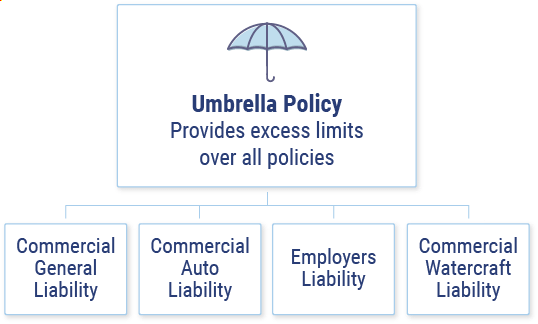Chances are slim that you will lose a lawsuit for a sum greater than what your existing insurance will pay. But if you ever did find yourself in that situation, you could lose all your savings and other assets. A good umbrella policy can prevent that nightmare from happening.
Umbrella insurance is a type of personal liability insurance that can cover claims in excess of the limits of your regular insurance policy. Below, we’ll take a closer look at this extra liability coverage: how an umbrella policy works, who needs it, how much it costs and what it won’t cover.
- Umbrella insurance is a type of personal liability insurance that covers claims in excess of regular homeowners, auto, or watercraft policy coverage.
- Umbrella insurance covers not just the policyholder, but also other members of their family or household.
- Umbrella insurance covers injury to others or damage to their possessions.
- It doesn’t protect the policyholder’s property or liability due to injury or damage caused on purpose.
- Umbrella insurance is quite cheap compared to other types of insurance.
What Is Umbrella Insurance?
Umbrella insurance is a type of personal liability insurance that can be indispensable when you find yourself liable for a claim larger than your homeowner’s insurance or auto insurance will cover. If you own a boat, umbrella insurance will also pick up where your watercraft’s liability insurance leaves off.
Umbrella insurance also covers certain liability claims that those aforementioned policies may not, such as libel, slander, and false imprisonment. And if you own rental property, umbrella insurance provides liability coverage beyond what your renter’s policy covers.
How Does an Umbrella Policy Work?
Here are some examples of incidents where an umbrella policy could provide financial coverage if your homeowner’s insurance or auto insurance isn’t enough:
- Your dog runs out of the house and viciously attacks a neighbor who was going for a walk. Your neighbor sues you to cover her medical bills, lost wages, and pain and suffering.
- Your daughter gets into a fight at school and punches another girl, breaking her nose. The girl’s parents sue you.
- You cause a 10-car accident and your auto insurance property damage coverage isn’t high enough to replace all 10 accident victims’ vehicles. Nor is your personal liability coverage high enough to pay for their medical bills.
- You send sandwiches to your son’s school for a field trip lunch. Several students develop food poisoning and their parents sue you.
- Your teenager throws a party at your house while you’re out of town. Someone brings alcohol to the party, and one of the guests is arrested for driving under the influence on the way home. You are sued.
As you might have gleaned from these examples, umbrella insurance covers not just the policyholder, but also other members of their family or household. So if your teenager isn’t the best driver, you can sleep better at night knowing your umbrella policy will cover the injured parties’ medical bills if your kid is found liable for a major accident. That being said, make sure you understand how your policy defines a household member so you’ll actually have the coverage you need.
You might have also noticed that, even though umbrella insurance acts as coverage above and beyond your homeowners and auto insurance, the incident doesn’t have to involve your property or your vehicle for your umbrella insurance to cover it. You’re also covered worldwide, with the exception of homes and cars you own under other countries’ laws.
| Quick Reference for Umbrella (Personal Liability) Coverage | |
| Usually Covers | Usually Does Not Cover |
| Claims beyond coverage provided by home, rental, auto, watercraft policies for injury/damage to people/property | Damage to policyholder’s own property (e.g., home, car, possessions) |
| Policyholder plus members of household | Damage/injury that policyholder causes intentionally or criminally |
| Malicious prosecution, wrongful entry, invasion of privacy | Damage/injury from or during business or professional activities |
| Libel, slander, false imprisonment | Liability assumed contractually |
| Attorney fees/other expenses related to lawsuits | Liability related to armed conflicts |
Do You Need Umbrella Insurance?
When you own property—be it a home, a car, or a boat—having adequate damage and liability insurance is essential. But if you’re responsible for damage or injury to someone else’s property or person, your coverage may fall woefully short.
Enter umbrella insurance, which provides liability coverage beyond most property insurance policies. This includes coverage for damages caused by you and members of your household, as well as limited coverage in the event you’re sued.
“Umbrella insurance is a way to protect you in a worst-case scenario,” says Austin Jarvis, director of trust, tax, and estate at the Schwab Center for Financial Research. Consider an insurance policy for a boat with liability coverage of $100,000. If a wrongful-death lawsuit leads to $1 million in damages, the other $900,000 would come from the policyholder’s own pocket—unless they have a $1 million umbrella policy, which would cover the gap between the boat policy and the total damages due.
Although umbrella insurance is of particular value to affluent individuals with significant assets to protect, nearly anyone can benefit from the extra coverage. In general, Austin says those making $250,000 or more a year should consider at least a minimal umbrella policy, especially as premiums on such policies are relatively low.
“The best thing about umbrella insurance is that it’s on the cheaper side because you generally have to exhaust your other policies before it kicks in,” Austin explains, “whereas selecting higher liability coverage on individual policies can quickly become cost-prohibitive.”
When purchasing any new insurance, an experienced broker can help ensure your policies work together while avoiding unnecessary coverage. “As a rule of thumb, your total coverage should never exceed your net worth,” Austin says, “because under no circumstances do you need to protect more than you own.”
